|
||||||||
|
|
|
2016-04-22 ArtNo.45727
◆Review:The baptism of the Holy Spirit (A rest)
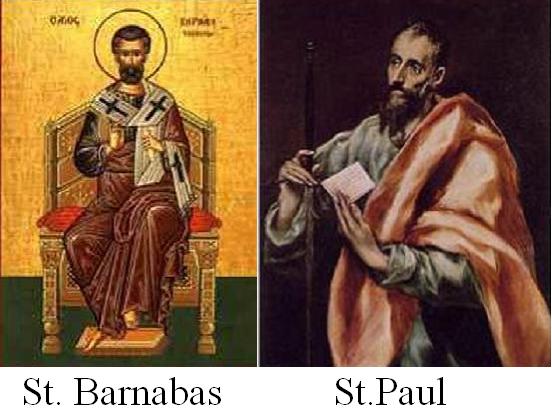 When a severe famine spread over Judea and Barnabas and Paul visited to the Jerusalem Church to donat the relief money from the Antioch Church (Acts 11:28-30), King Herod (Herod Agrippa I) forth his hands to vex certain of the church. And he killed James the brother of John with the sword. When he saw that this pleased the Jews, he arrested Peter also and imprisoned him. Although Herod intended to bring him out for public trial after the Passover, Peter easily escaped from the prison. He went to the house of Mary, the mother of John, also called Mark, and told, "Tell James and the brothers about this." Then he left for another place. (Acts 12:1-17) ○《The Gateless Barrier CASE 15: DongShan's Sixty Blows》 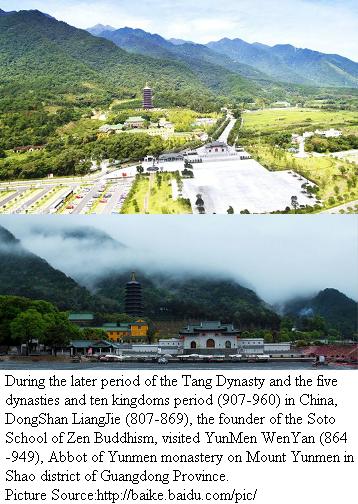 During the later period of the Tang Dynasty and the five dynasties and ten kingdoms period (907-960) in China, DongShan LiangJie (807-869), the founder of the Soto School of Zen Buddhism, visited YunMen WenYan (864-949), Abbot of Yunmen monastery on Mount Yunmen in Shao district of Guangdong Province. YunMen asked DongShan, who was still young, "Where have you come from?" DongShan said, "From Chadu." YunMen said, "Where were you during the summer retreat?" DongShan said, "At Baoci Monastery, south of the lake." YunMen said, "When did you leave there?" DongShan said, "On the twenty-fifth of August." YunMen said, "I spare you sixty blows." The next day DongShan came up to YunMen and asked, "Yesterday you spared me sixty blows though I deserved them. I beg you, sir, where was I at fault?" YunMen said, "Oh, you ricebag! Have you been wandering about like that, now west of the river, now south of the lake?" At this, DongShan had great realization. ○《WuMen's Commentary》 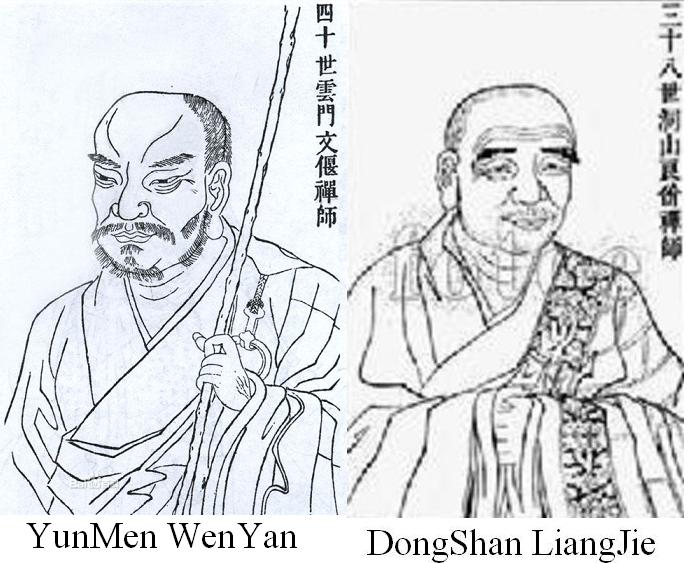 WuMen HuiKai(1182-1260), who wrote "WumenGuan (The Gateless Barrier)," an analects of Koan (Koans are subjects which Zen masters give their students in the meditation hall) during the Sung Dynasty in China, commented; At that time, if YunMen had given DongShan the essential food of Zen and awakened him to an active Zen spirit, his family gate would not have become so desolate. DongShan struggled with himself in agony all through the night and at daybreak came to YunMen again. YunMen gave him a further push to break through. DongShan attained realization immediately and YunMen was not hasty. However, I ask you, does DongShan deserve sixty blows with the stick or not? If you say he does, then all the trees, grasses, thickets, and groves should be beaten. If you say he does not, then YunMen is telling a lie. If you grasp this clearly, you are breathing through one mouth with DongShan (you can take a rest for a while together with DongShan). ○Ikkyu's cause of enlightenment 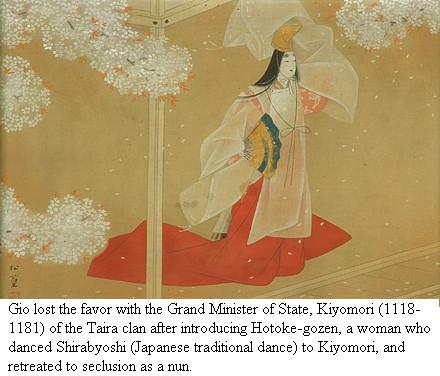 In Muromachi era of Japan, a lot more recent than Song Dynasty, Ikkyu (1394-1481) in his young days, was also given this koan by Zen Master Kaso Sodon (1351-1428) at Zenko-an, a branch temple of Daitoku-ji. and worked hard on this koan. One day, a blind biwa (Japanese lute) minstrel performed the chapter in "The Tale of Heike" called 'Gio' at the temple and Ikkyu penetrated his koan while engrossed in the minstrel and made a poem, "A rest on the way back from the Leaky Road to the Never-leaking Road; If it rains, let it rain; If it blows, let it blow." In recognition of his understanding Kaso gave him the Dharma name 'Ikkyu,' which means 'One Pause.' Ikkyu, who is said to have been the illegitimate child of Emperor Gokomatsu, seems to have superposed his and his mother's fate on Gio's destiny and made such poem. Gio lost the favor with the Grand Minister of State, Kiyomori (1118-1181) of the Taira clan after introducing Hotoke-gozen, a woman who danced Shirabyoshi (Japanese traditional dance) to Kiyomori, and retreated to seclusion as a nun. Later, Hotoke-gozen also felt that she would rather pray to Buddha than indulge in the fleeting pleasures of the world and joined Gio's secluded life. Gio, her sister and her mother and Hotoke-gozen devoted themselves to invocations to Buddha in hope of being reborn in the western paradise of Amida Buddha, while Taira clan, whose prosperity and power had been unequaled at once, was defeated in the battle with Minamoto clan and disappeared as algae wastes of the sea of Dan-no-ura. "The Leaky Road" refers to this world of confusion (distracting thoughts), while the "Never-leaking Road" refers to the world of enlightenment (Buddha) and one who is having a rest in the middle of them is a human being. 'A rest' also means, "I am now going into a crucial moment." However, we have originally come from there and now just return to our origin. One, who prepares like that, does not worry about anything such as rain and wind. At the beginning of Shushogi Sutra (The Meaning of Practice and Verification), Dogen Zenji (1200-1253), the founder of the Japanese Soto Zen School, preaches, "The most important issue of all for Buddhists is the thorough clarification of the meaning of birth and death. If the buddha is within birth and death, there is no birth and death. Simply understand that birth and death are in themselves nirvana; there is no birth and death to be hated nor nirvana to be desired. Then, for the first time, we will be freed from birth and death. To master this problem is of supreme importance." ○A rest on the way back from the Leaky Road to the Never-leaking Road; If it rains, let it rain; If it blows, let it blow. 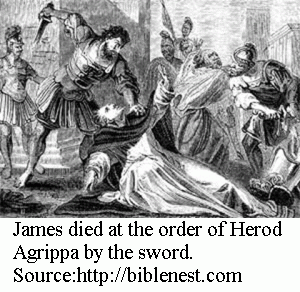 When a severe famine spread over Judea and Barnabas and Paul visited to the Jerusalem Church to donat the relief money from the Antioch Church (Acts 11:28-30), King Herod (Herod Agrippa I) forth his hands to vex certain of the church. And he killed James the brother of John with the sword. When he saw that this pleased the Jews, he arrested Peter also and imprisoned him. Although Herod intended to bring him out for public trial after the Passover, Peter easily escaped from the prison. He went to the house of Mary, the mother of John, also called Mark, and told, "Tell James and the brothers about this." Then he left for another place. (Acts 12:1-17) ○The ambition of Agrippa I 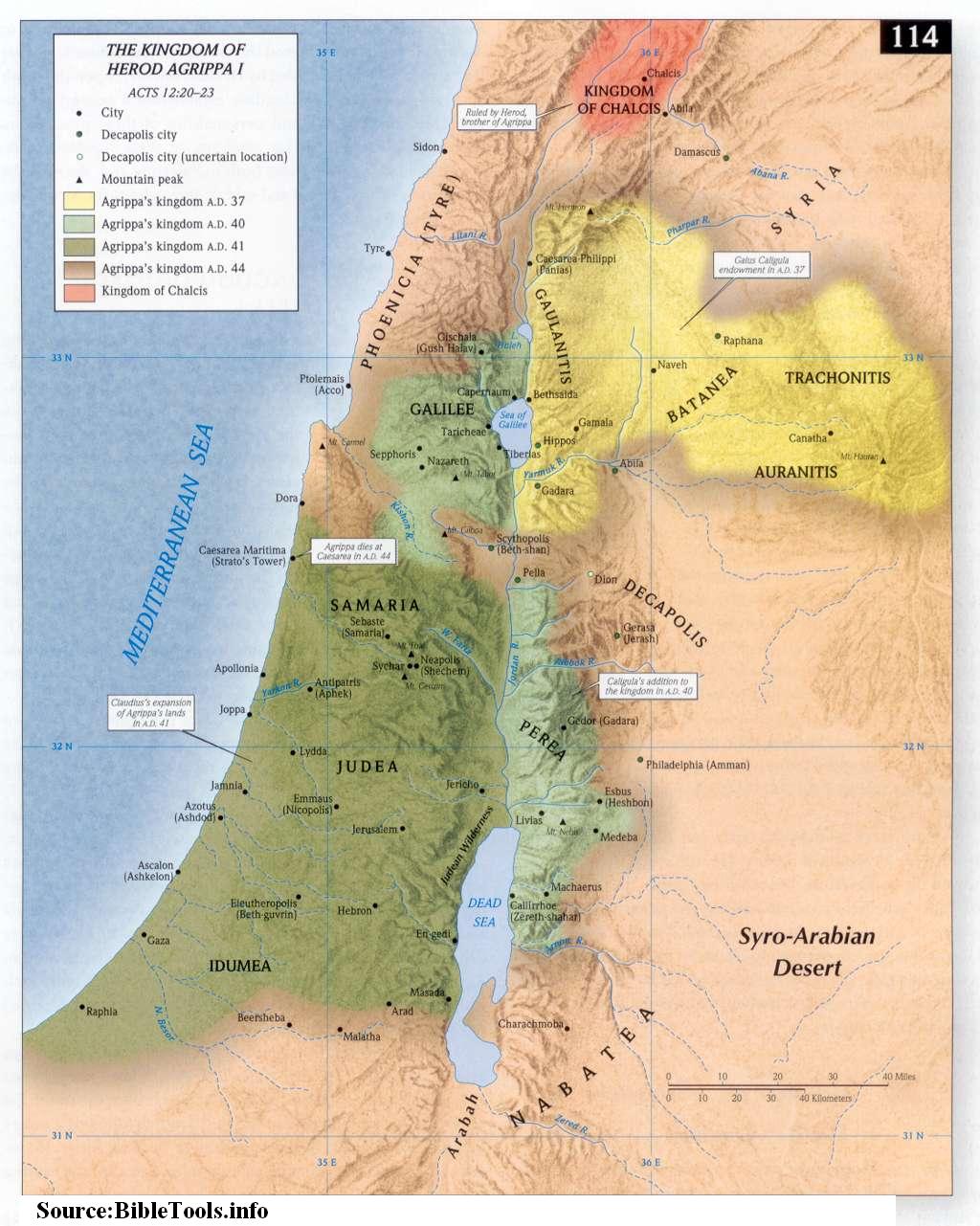 Agrippa I's father, Aristobulus IV was the son of Herod the Great and his second wife, Mariamne I, the Hasmonean Princess. But Aristobulus IV was killed together with his brother on charges of treason by Herod the Great. However, Herod the Great seems haven't intended to make the Hasmonean lineage died out. According to Josephus, after the murder of his father, young Agrippa was sent by Herod the Great to the imperial court in Rome. There, Roman Emperor Tiberius conceived a great affection for him, and had him educated alongside his son Drusus, who also befriended him, and his nephew Claudius. After that, his young life was full of ups and downs. Any way, Agrippa I formed an intimacy with Caligula and as Caligula became the Roman emperor in 37, he was appointed to lord of the territories of Trans-Jordan, which his uncle Philip the Tetrarch had held. In 39, Agrippa was granted his uncle Herod Antipas' tetrarchy, consisting of Galilee and Peraea, with Antipas' banishment. After the assassination of Caligula in 41, Agrippa I seems to have mediated Claudius and the Senate in the struggle over the accession and he obtained the sovereignty of Judea, Samaria and Idomaya after Claudius' enthronement. In addition. Claudius gave the kingdom of Chalcis in Lebanon to Agrippa's brother Herod of Chalcis at his request. Thus Agrippa's domain more or less equaled that which was held by his grandfather Herod the Great. Although Herod the Great stripped political power of the Sanhedrin, because the latter had often acted against the former's rule, the Roman Governor granted again partial sovereignty to the Sanhedrin led by the High priest after Herod Archelaos' misgovernment and downfall, Therefore, the high priests such as Annas and Caiaphas and other members of the Sanhedrin seem to have deeply involved behind the establishment of the primitive Christian church in Jerusalem. However, because Agrippa I was granted sovereignty of nearly throughout Israel, the crustal movement seems to have occurred not only on the relationship between the palece of Herod and the Roman Governor but also among the religious community of Jerusalem. The Acts of the Apostles calls both Agrippa I and his son Agrippa II as 'King Herod,' but neither Agrippa I nor Agrippa II actually became king. However, Agrippa I, who had obtained a domain equaled with the one held by Herod the Great, seems to have thought that only he, who had the lineage of Mattathias, a priest from Modi'in, who had revolted against the rule of the Seleucid King of Syria, could realize the restoration of Israel based on the prophecy of the Old Testament Book of Daniel and to have embarked on a religious reform involving not only about 800 thousand Jews in his country but also about 4 million Jews outside the county and several times more gentile followers. ○Mystery of Peter's jailbreak 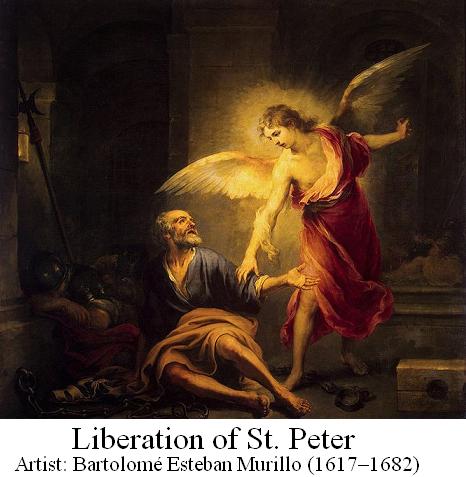 The book of the Acts implies that Agrippa I did not target the church itself but targeted only certain of the church, saying "Herod stretched forth his hands to vex certain of the church." James, who was killed, and Peter, who was put in prison, were both former disciples of John the Baptist. James' brother Jon and Peter's brother Andrew both, who were also former disciples of John the Baptist, seem to have been safe. Because Peter said "Tell James and the brothers about this," at Mark's mother's house, to which Peter had first and foremost went after escaping from the prison, Jesus' brothers appear to have based on different place from that house. The house, which had used as the Venue of the Last Supper and the inauguration of Jerusalem Church, was the meeting place of the Essenes. From the description, "Then he left for another place," (Acts 12:17) it also seems that the group of former disciples of John the Baptist might also have maintained different agitating-point to escape Agrippa's pursuit. ○Deteriorating relation between Royal family and Colonial cities 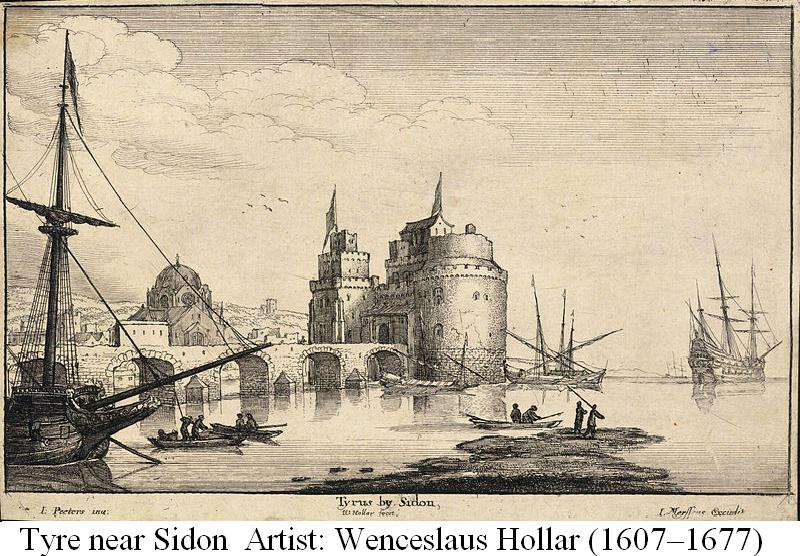 After Agrippa I, who had sentenced the guards conniving Peter's jailbreak to death, went to Caesarea, where the official residence of the Roman governor was, and stayed there a while, he seems to have returned to his palace of Caesarea Philippi. At that time, Galilee was one of the largest granary in the Middle East and the colonial cities of the Phoenicians (such as Tyre and Sidon) and the Greeks, who had been exporting agricultural surplus in that region, prospered in the surrounding area. While the relationship between the Palestinian Monarchies and the colonial cities, which often refused to convert to Judaism and demanded autonomy, did not go well since Hasmonean dynasty had built the first unified nation in Palestine except in the mythical era. Since the export of agricultural products had been restricted thanks to the famine in Judea, the relationship between the Palace of Agrippa I, who was of Hasmonea lineage, and the residents of Tyre and Sidon seems to have been deteriorated again. ○Jesus loves the colonial cities 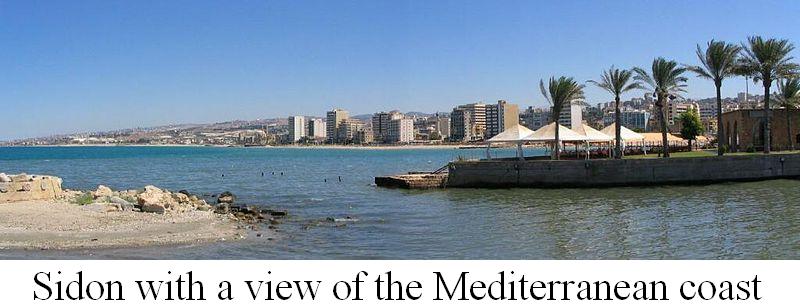 Meanwhile Jesus says that Tyre and Sidon are better than cities in Galilee where he grew and set the base of his missionary work (Matthew 11:20-24), and he seems to have often visited these cities. (Matthew 15:21/ Mark 7:24) According to Professor James D. Tabor, Chair of the Department of Religious Studies at the University of North Carolina, at that time, Roman army the first cohort of archers stationed in Sidon. And Tiberius Iulius Abdes Pantera, who is said to be Jesus' real father, belonged to this cohort. ○Sudden death of Agrippa I 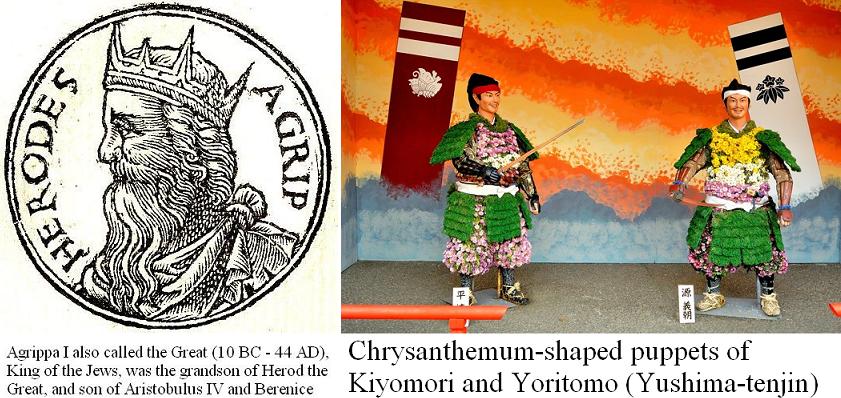 After securing the support of Blastus, a trusted personal servant of Herod Agrippa I, the people of Tyre and Sidon joined together and sought an audience with him to ask for peace. On the appointed day Herod, wearing his royal robes, sat on his throne and delivered a public address to the people. They shouted, "This is the voice of a god, not of a man." Immediately, an angel of the Lord struck him down, and he was eaten by worms and died, because Herod did not give praise to God. After describing as above, the book of The Acts has concluded the chapter with the words, "The word of God continued to increase and spread. And Barnabas and Saul (Paul) finished their mission and returned from Jerusalem, taking with them John, also called Mark." (Acts 12:20-25) Thus, the eventful life of Agrippa I, who had not only played leading role as if he were both Kiyomori of the Taira clan and Yoritomo of the Minamoto clan in "The Tale of Heike" in Israel but also seems to have had involved in the succession races going into the court of the Roman Empire, suddenly came to an end. ○Implicit descriptions of the Acts 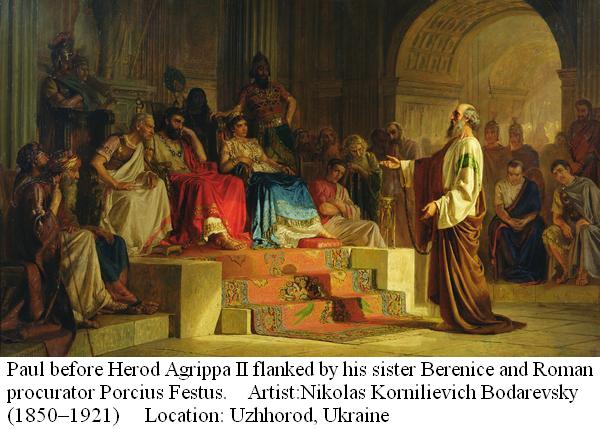 While Herod Agrippa I is said to have died in 44, according to the descriptions of The Acts, Barnabas and Paul appears to have witnessed the whole stories of these incidents in Jerusalem. James the Greater was killed, why Peter, Andrew and John, who were all the former disciples of John the Baptist same as James the Greater, could escape from martyrdom? The Book of The Acts concludes the chapter 12, which describes the incidents such as "Martyrdom of James the Great," "the Jailbreak of Peter," "the friction of the palace and colonial cities," "the Sudden death of Agrippa I" and "the circumstances of Barnabas and Paul who stayed in Jerusalem and seem to have witnessed the whole incidents," with the following words, "The word of God continued to increase and spread," and implies that the God's will, which might have determined the subsequent fate of the Primitive Church, and the providence of "All glories must fade" worked behind these incidents which seem to have been nothing to each other at a glance. According to The Acts, in the Antioch Church, there were prophets and teachers, including not only Barnabas and Paul but also Manaen who had been brought up with Herod the tetrarch. (Acts 13:1) And it says that when Agrippa II arrived at Caesarea to pay his respect to the Prefect Festus, he met Paul, who had been arrested there, and was impressed by the latter's words. (Acts 24:27-26:32) More over, Mr. Tabor points out that the family of Paul's sister who lived in Jerusalem appears to have had access to the Roman authorities in Jerusalem according to the Acts (Acts 23:16-22) and Paul possibly had some connection to Herod's family too, because he mentioned a relative named Herodion, who lived in Rome, in the Epistle to the Romans. While The Acts always criticizes Herod royal family with extremely harsh words such as "Herod Agrippa I was eaten by worms and died," in contrast, the book also tells a lot of evidences suggesting the factions of the Primitive Church such as the group of brothers of the Lord, the group of former disciples of John the Baptist and the Hellenist's group led by Paul, held an intimate relationship with the royal family.<To be continued.> 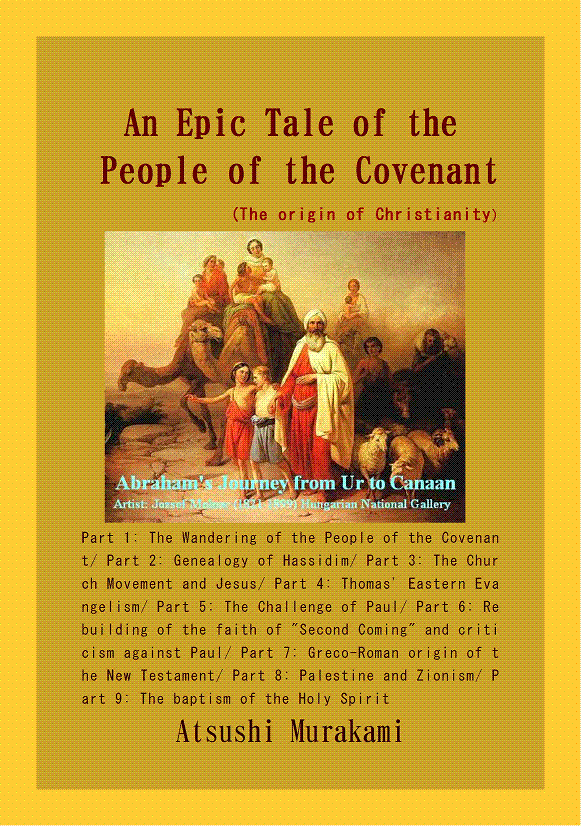 ○What is "Baptism with The Holy Spirit"? According to the dialectic of the Gospel of John, 【Thesis】"A man can possess eternal life through accepting testimony of the Son of man and being baptized by him." (John 5:24) 【Anti-thesis】But "The one who comes from the earth cannot accept the testimony by one from heaven."(John 3:32) How then can a man possess eternal life? 【Synthesis】"If you want to be baptized with the Holy Spirit, you can just go back to the word which was with God in the beginning (John 1:1) and certify that God is truthful. (John 3:33)" When he said, "You are Huichao," Zen Master Fayan thrusted vivid Self in Huichao in front of his eyes. (P.171) Purchase here [Reference] ○The Acts Chapter 12 1 It was about this time that King Herod arrested some who belonged to the church, intending to persecute them. 2 He had James, the brother of John, put to death with the sword. 3 When he saw that this met with approval among the Jews, he proceeded to seize Peter also. This happened during the Festival of Unleavened Bread. 4 After arresting him, he put him in prison, handing him over to be guarded by four squads of four soldiers each. Herod intended to bring him out for public trial after the Passover. 5 So Peter was kept in prison, but the church was earnestly praying to God for him. 6 The night before Herod was to bring him to trial, Peter was sleeping between two soldiers, bound with two chains, and sentries stood guard at the entrance. 7 Suddenly an angel of the Lord appeared and a light shone in the cell. He struck Peter on the side and woke him up. “Quick, get up!” he said, and the chains fell off Peter’s wrists. 8 Then the angel said to him, “Put on your clothes and sandals.” And Peter did so. “Wrap your cloak around you and follow me,” the angel told him. 9 Peter followed him out of the prison, but he had no idea that what the angel was doing was really happening; he thought he was seeing a vision. 10 They passed the first and second guards and came to the iron gate leading to the city. It opened for them by itself, and they went through it. When they had walked the length of one street, suddenly the angel left him. 11 Then Peter came to himself and said, “Now I know without a doubt that the Lord has sent his angel and rescued me from Herod’s clutches and from everything the Jewish people were hoping would happen.” 12 When this had dawned on him, he went to the house of Mary the mother of John, also called Mark, where many people had gathered and were praying. 13 Peter knocked at the outer entrance, and a servant named Rhoda came to answer the door. 14 When she recognized Peter’s voice, she was so overjoyed she ran back without opening it and exclaimed, “Peter is at the door!” 15 “You’re out of your mind,” they told her. When she kept insisting that it was so, they said, “It must be his angel.” 16 But Peter kept on knocking, and when they opened the door and saw him, they were astonished. 17 Peter motioned with his hand for them to be quiet and described how the Lord had brought him out of prison. “Tell James and the other brothers and sisters about this,” he said, and then he left for another place. 18 In the morning, there was no small commotion among the soldiers as to what had become of Peter. 19 After Herod had a thorough search made for him and did not find him, he cross-examined the guards and ordered that they be executed. Then Herod went from Judea to Caesarea and stayed there. 20 He had been quarreling with the people of Tyre and Sidon; they now joined together and sought an audience with him. After securing the support of Blastus, a trusted personal servant of the king, they asked for peace, because they depended on the king’s country for their food supply. 21 On the appointed day Herod, wearing his royal robes, sat on his throne and delivered a public address to the people. 22 They shouted, “This is the voice of a god, not of a man.” 23 Immediately, because Herod did not give praise to God, an angel of the Lord struck him down, and he was eaten by worms and died. 24 But the word of God continued to spread and flourish. 25 When Barnabas and Saul had finished their mission, they returned from[a] Jerusalem, taking with them John, also called Mark. ○Matthew 11:20-24 Then Jesus began to denounce the cities in which most of his miracles had been performed, because they did not repent. "Woe to you, Korazin! Woe to you, Bethsaida! If the miracles that were performed in you had been performed in Tyre and Sidon, they would have repented long ago in sackcloth and ashes. But I tell you, it will be more bearable for Tyre and Sidon on the day of judgment than for you. And you, Capernaum, will you be lifted up to the skies? No, you will go down to the depths. If the miracles that were performed in you had been performed in Sodom, it would have remained to this day. But I tell you that it will be more bearable for Sodom on the day of judgment than for you." ○Matthew 15:21 Leaving that place, Jesus withdrew to the region of Tyre and Sidon. ○Mark 7:24 Jesus left that place and went to the vicinity of Tyre. He entered a house and did not want anyone to know it; yet he could not keep his presence secret. ○The Gateless Barrier CASE 15: DongShan's Sixty Blows 《Case》 When DongShan came to YunMen for instruction, YunMen asked, "Where have you come from?" DongShan said, "From Chadu." YunMen said, "Where were you during the summer retreat?" DongShan said, "At Baoci Monastery, south of the lake." YunMen said, "When did you leave there?" DongShan said, "On the twenty-fifth of August." YunMen said, "I spare you sixty blows." The next day DongShan came up to YunMen and asked, "Yesterday you spared me sixty blows though I deserved them. I beg you, sir, where was I at fault?" YunMen said, "Oh, you ricebag! Have you been wandering about like that, now west of the river, now south of the lake?" At this, DongShan had great realization. 《WuMen's Commentary》 At that time, if YunMen had given DongShan the essential food of Zen and awakened him to an active Zen spirit, his family gate would not have become so desolate. DongShan struggled with himself in agony all through the night and at daybreak came to YunMen again. YunMen gave him a further push to break through. Although DongShan attained realization immediately, he still could not be called bright. Now I ask you, does DongShan deserve sixty blows with the stick or not? If you say he does, then all the trees, grasses, thickets, and groves should be beaten. If you say he does not, then YunMen is telling a lie. If you grasp this clearly, you are breathing through one mouth with DongShan. ○Opening lines of "The Tale of Heike" The sound of the bell of Gion-shoja, rings with the transience of all things, the color of the flowers of paired sal trees, shows the truth that all glories must fade. ○"The Tale of Heike" Chapter 'Gio' 祇王失寵 Please use IE or Japanese (EUC) 京都《平家物語》主題散步 ○Shushogi The Soto Zen Text Project 香港寶蓮禅寺 曹洞宗東海管区教化センター 曹洞宗貞昌院 Your Comments / UnsubscribeSEAnewsFacebookSEAnewsGoogleSEAnews eBookstore(Google)SEAnews world circulation |
|
[Your Comments / Unsubscribe]/[您的意见/退订]/[ご意見/配信停止]
Please do not directly reply to the e-mail address which is used for delivering the newsletter. 请别用递送新闻的邮件地址而直接回信。 メールをお届けした送信専用アドレスには返信しないで下さい。 |